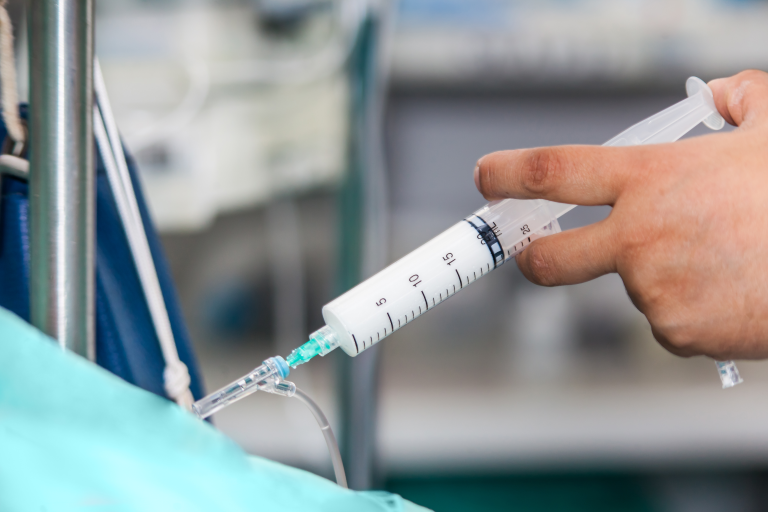When preparing for surgery, one of the most critical instructions you’ll receive is not to eat or drink before your procedure. This fasting period is essential for ensuring your safety while under anesthesia. Understanding why this is necessary can help you better prepare for your surgery and avoid potential complications.
Why should you fast before anesthesia?
Fasting before anesthesia is a crucial step in preoperative preparation. While it might seem inconvenient, this precaution is essential for your safety during surgery. Eating or drinking before anesthesia can lead to serious complications that can compromise the success of the procedure and your overall well-being. There are two main reasons why you can’t eat before general anesthesia:
- Unconsciousness Causes Loss of Bodily Control: When you are under general anesthesia, you are in a state of unconsciousness. This means you lose control over your bodily functions, including the ability to swallow and protect your airway.
- Possibility of Aspiration: If your stomach contains food or liquids during anesthesia, there is a risk that these substances could be regurgitated and aspirated into your lungs. This is known as aspiration and can lead to serious complications such as pneumonia or even respiratory failure.
Understanding the reasons behind this directive can help you adhere to it more diligently and reduce any anxiety about the fasting process.
What happens if you eat before anesthesia?
When you’re under anesthesia, your body’s normal reflexes are significantly reduced or completely absent. If your stomach isn’t empty, you risk the possibility of anesthesia-related aspiration. As mentioned above, aspiration occurs when the contents of the patient’s stomach enter their lungs and trachea when the patient passively or actively regurgitates stomach contents due to a lack of laryngeal protective reflexes (due to the anesthesia). Aspiration can be life-threatening and is often fatal.
Tips for fasting before general anesthesia
To ensure your safety during general anesthesia, it is crucial to follow specific fasting guidelines provided by your healthcare team. Here are some essential tips to help you prepare for anesthesia:
- Nils Per Os/Nothing by Mouth: The term “nils per os” (NPO) means nothing by mouth. This includes all food and drinks. Adhering to this rule is vital for minimizing the risk of complications during anesthesia.
- Avoid Soup, Sweets, Chewing Gum, Milk, Tea, or Coffee: Even small amounts of food, sweets, chewing gum, or beverages like milk tea and coffee can increase the risk of aspiration. It’s important to avoid all these items completely before your procedure.
- Clear Liquids Only: If allowed by your doctor, you may consume clear liquids up to a certain time before anesthesia. Acceptable clear liquids include water, weak black tea, black coffee, and weak cordial or squash. These liquids pass through the stomach quickly and are less likely to cause complications.
By following these fasting tips, you help create a safer environment for your surgical team to work in, and reduce the risk of complications during your procedure.
What to eat after anesthesia
After your surgery, your body needs time to recover, and your digestive system might be more sensitive than usual. Here are some guidelines on what to eat and drink post-anesthesia to ensure a smooth recovery:
- Drink Small Amounts of Clear Liquids: Initially, stick to clear liquids such as water, soda, or apple juice. These are easy on the stomach and help keep you hydrated without causing nausea.
- Avoid Sweet, Spicy, Hard-to-Digest Foods: On the day of your surgery, avoid foods that are sweet, spicy, or hard to digest. These can irritate your stomach and lead to discomfort or nausea.
- If Nauseous, Rest Your Stomach: If you experience nausea after anesthesia, give your stomach a break. Rest for about an hour and then try drinking clear liquids again to see if your stomach can tolerate them.
Following these tips can help you ease back into eating and drinking comfortably after your procedure.
How long before anesthesia can you drink coffee?
Coffee, like any other liquid, must be consumed with caution before surgery. While it is generally advised to avoid all food and drinks before anesthesia, there are specific guidelines regarding clear liquids, including black coffee. You can drink clear liquids, such as black coffee (without milk or cream), up to 2-3 hours before your scheduled surgery. It’s important to ensure the coffee is black, as adding milk or cream turns it into a non-clear liquid, which can increase the risk of complications.
How soon after general anesthesia can I drink alcohol?
After undergoing general anesthesia, it is generally advised to avoid consuming alcohol for at least two weeks. This recommendation is based on several factors:
- Blood Thinning and Bleeding: Alcohol can thin the blood, which may lead to excessive bleeding and increased swelling, both of which can complicate the healing process and prolong recovery.
- Interaction with Medications: Post-surgery, patients are often prescribed painkillers or antibiotics. Mixing these medications with alcohol can cause severe side effects such as nausea, headaches, drowsiness, and even breathing difficulties.
- Impact on Healing: Alcohol can weaken the immune system, increase the risk of infection, and cause dehydration, all of which can negatively affect the healing process.
- Anesthesia Effects: The effects of anesthesia can linger for a few days post-surgery, and consuming alcohol during this period can exacerbate these effects, making recovery more difficult.
How long after general anesthesia can you eat?
Most people can start drinking fluids soon after surgery, which helps with hydration and clearing anesthetics from the body. Chewing gum is also encouraged to help wake up the bowels. As for eating, you will likely be offered food the evening or the morning after surgery. Initially, you’ll start with smaller, lower fiber meals to accommodate the slower movement of your bowels. Gradually, you can increase the amount of food you eat each day.
Can you drink tea before anesthesia?
Yes, you can drink clear fluids, including tea, up to two hours before receiving anesthesia. Clear fluids are defined as liquids that you can see through, such as water, apple juice, and plain tea without milk or creamer. This practice is generally safe and helps to keep patients hydrated and more comfortable before surgery.
Stay prepared and ready for your anesthesia
Fasting before anesthesia is a vital aspect of surgical preparation that cannot be overlooked. By understanding the reasons behind the fasting guidelines and adhering to them strictly, you can significantly reduce the risk of complications such as aspiration.
Following the recommended fasting tips, being mindful of what you eat and drink after surgery, and knowing the appropriate timing for consuming clear liquids like black coffee can help ensure a smoother and safer surgical experience. Always follow your healthcare team’s specific instructions to protect your health and enhance your recovery.

